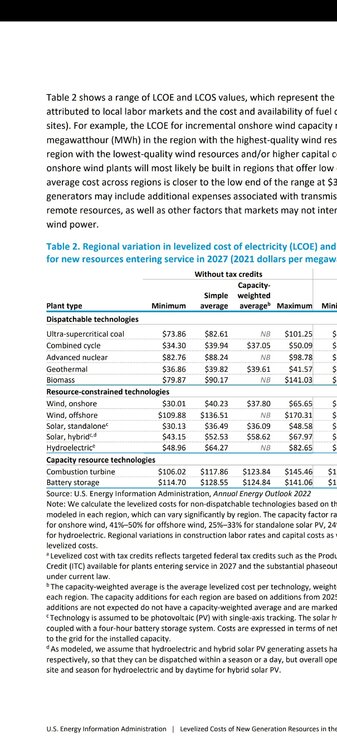
skierinvermont
Members-
Posts
13,101 -
Joined
-
Last visited
About skierinvermont

Profile Information
-
Gender
Not Telling
-
Location:
Fort Collins, CO
Recent Profile Visitors
-
Having undergone a similar change in thinking, I appreciate the honesty and humility. While I never denied that co2 was a significant ghg, from 2007-2010 I entertained the idea that 21st century warming could be around 0.5C due to false ideas about sun cycles, ocean cycles, and negative feedbacks. That experience taught me to have greater deference to the professional experts in a field, especially when my own understanding is incomplete.
-
Mountain West Discussion
skierinvermont replied to mayjawintastawm's topic in Central/Western States
Depth on grass was this morning 8" so guessing received about 9-10" -
Mountain West Discussion
skierinvermont replied to mayjawintastawm's topic in Central/Western States
5700 -
Occasional Thoughts on Climate Change
skierinvermont replied to donsutherland1's topic in Climate Change
The argument against energy efficiency makes sense. But solar and wind allow for stable or increasing energy production without the CO2, just like nuclear, but at 1/3 of the cost. Nuclear might be more effective at reducing emissions simply because it is more expensive and the high costs, if passed on to the consumer, would reduce energy consumption overall. But that's like saying going back to coal energy or whales oil would solve climate change. They are not politically feasible or economically optimal. Solar and wind, up to 60 or 70% of energy production, would dramatically reduce emissions without lowering living standards the way that whales oil or nuclear would. After 60 or 70% you do have to consider costlier options like storage and carbon capture. Thr fact that decarbonization has not exceeded growth is just as much a condemnation of nuclear as it is solar and wind. Actually moreso given nuclear has existed for decades and reached its height in the 90s which was also when co2 emissions were accelerating rapidly. At least solar and wind have plateaud or in some cases reduced emissions in some developed nations. It just needs to be accelerated. We do need to pay more for energy, but via penalties on co2 emissions and subsidies of sources without emissions. So far we've been unwilling to pay more. -
Occasional Thoughts on Climate Change
skierinvermont replied to donsutherland1's topic in Climate Change
OK fine. All energy sources since the woodburning stove are stop gaps until fusion. Regardless, your claims about the cost of solar and wind vs nuclear are false and unsupported. As well as your claims regarding ohc. -
Occasional Thoughts on Climate Change
skierinvermont replied to donsutherland1's topic in Climate Change
I'm not being aggressive. I'm asking you to support your unsubstantiated claims with sources, since your claims are widely contracted by various research organizations such as the EIA and IPCC. You responded to mainstream well sourced cost studies on nuclear vs wind solar and gas with a snarky "sorry this is anti-nuclear bs" and no sources to back up your radical claims. Wind and solar are not stop gaps. More unsourced nonsense. Maybe you should take some of your unsourced hunches to the execs at power companies who are building solar and wind hand over fist based on the industry cost studies I cited. -
Occasional Thoughts on Climate Change
skierinvermont replied to donsutherland1's topic in Climate Change
You have to provide evidence for opposing viewpoints. You've provided none other than your personal hunches. You don't think the hundreds of scientists that have done hundreds of thousands of hours of research and reviewing of ohc data have considered the amateur objections you have raised? Thermocline barriers and heat content of water are taught in 8th grade science. -
Occasional Thoughts on Climate Change
skierinvermont replied to donsutherland1's topic in Climate Change
Your own graphic shows that from 1971-2010 the majority of sea level rise was thermal expansion. My statement was a slight exaggeration I will give you that. It's good to know you question the data. I'm sure the scientists and peer reviewed journals would welcome your amateur questions. But thank you for openly admitting that your opinions are based on personal hunches and not the work and research of professionals. We will know whose opinions to disregard going forward. You haven't actually cited any sources to support any of your various opinions which are mostly contradicted by professional research organizations. -
Occasional Thoughts on Climate Change
skierinvermont replied to donsutherland1's topic in Climate Change
This is false. The large majority of sea level rise in the past 100 years was due to thermal expansion. The oceans have gained 337 zettajoules of thermal energy since 1955. That works out to 7 Hiroshimas every second for the last 2 trillion seconds (67 years). -
Occasional Thoughts on Climate Change
skierinvermont replied to donsutherland1's topic in Climate Change
The fact that we can't, yet, get to exactly 100% renewable energy is sort of irrelevant when we have the technology to get to 70% and are currently at 12% wind and solar. Get the 58% done and we can worry about the remaining 30% then. Possibilities exist such as storage and hooking up EVs to the grid. -
Occasional Thoughts on Climate Change
skierinvermont replied to donsutherland1's topic in Climate Change
Sorry the article is based on research by Stanford and is a respected German research group. The idea that wind or solar take more than trivial amounts of gas or oil to produce is simply oil industry propaganda. Nuclear plants take far more oil and gas to build and operate, which is still low compared to the amount of energy produced. The IPCC also states that nuclear is too expensive and has too many other problems to be a serious part of the climate solution. You've provided no evidence and are contradicted by highly reputable sources. It doesn't really matter what you think because the free market is building solar and wind hand over fist with minimal government support. We should be accelerating the process. From the EIA, nuclear costs nearly 3x as much as solar wind or gas. This is total levelized cost of energy over the life of the equipment. Please stop spreading misinformation. -
Occasional Thoughts on Climate Change
skierinvermont replied to donsutherland1's topic in Climate Change
The IPCC scenarios for limiting warming to 1.5C show very little role for Nuclear. It's simply too expensive. Wasting money on nuclear could aggravate and delay efforts to build out wind, solar, and carbon capture by diverting resources and political capital. -
Occasional Thoughts on Climate Change
skierinvermont replied to donsutherland1's topic in Climate Change
Nuclear electricity costs more than twice as much as natural gas, solar and wind electricity (by some estimates 5 times as much). "Building out nuclear" will make electricity more expensive, not less. https://eu.boell.org/en/2021/04/26/7-reasons-why-nuclear-energy-not-answer-solve-climate-change#:~:text=Barriers to and risks associated,concerns%2C and adverse public opinion. -
Occasional Thoughts on Climate Change
skierinvermont replied to donsutherland1's topic in Climate Change
it doesn't, for two reasons. We've talked about this before. It's just not going to happen. One it costs twice as much as solar, wind, and natural gas. But second, and even more importantly, natural gas plants are very cheap to build but expensive to operate, which makes them ideal backup generators. They allow you to get the grid to 70 or 80% wind/solar without even needing storage capacity, which would be a monumental accomplishment. Nuclear plants are extremely expensive to build and cannot be used as backup generators. The next step to get to 100% renewables, probably involves storage and smart grids. Not nuclear. https://eu.boell.org/en/2021/04/26/7-reasons-why-nuclear-energy-not-answer-solve-climate-change#:~:text=Barriers to and risks associated,concerns%2C and adverse public opinion. -
Occasional Thoughts on Climate Change
skierinvermont replied to donsutherland1's topic in Climate Change
Sure if you tried to get the whole world to 90% renewable power in 20 years you would incur some extreme costs. But the vast majority of power consumption in the world is through power grids that can be hooked up to solar and wind with backup natural gas power. Natural gas plants are cheap to build but expensive to operate. They only run when the suns not shining and winds not blowing. More developed countries can have more complex grids to distribute renewable power better. You don't need every country to be 100% renewables. You don't even need them to be 70%. You do need the U.S. Europe and China and some other developed nations to be 70%+ in the next 20 years. If the rest of the world is at 40 or 50% that's fine for 15-20 years from now. Getting to these levels would be quite cheap and the free market might even get us there alone, although at this rate it would take the free market more like 30 years to reach those kinds of targets. Once the developed world is at 60-70% renewable with the rest of the world averaging 40-50% renewable, maybe you start to run into some obstacles. But that's a long ways away. Right now the free market is building out renewables rapidly and it would take very little to significantly accelerate the process. There are comprehensive cost analysis that go into the kind of detail we are talking about. We don't need to speculate. Getting the world to mostly renewable energy is absolutely possible with minimal costs. This isn't 1980. Personally I'd argue the effects of climate change warrant a more accelerated timeline like 90% renewable in developed countries within 20 years and 70% elsewhere. And despite the long run cost savings and benefit to the planet I see very few countries stepping up and incurring those kinds of costs in the short run (unfortunately in my opinion). But the idea that we can't get to 60-70% in developed countries within 20 years and 40-50% elsewhere is kind of absurd. The free market alone will take us to those levels albeit a bit slower like 30 or 40 years.











